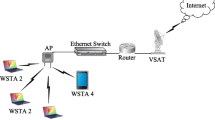Abstract
The de facto quality-of-service provisioning mechanism for wireless LANs is the Enhanced Distributed Channel Access (EDCA), which provides enhanced service differentiation based on four different prioritized Access Categories (ACs). In this paper, we show that the multiple category mechanism of EDCA causes a new type of unfairness problem among the ACs of same priority class when the numbers of active ACs in competing nodes are different. We present a simple analytical model to capture the impact of virtual collision, external collision, and Arbitration Interframe Space on the degree of this intra-class unfairness. Based on its analytical insight, we present a simple remedy scheme for resolving the unfairness and evaluate its efficiency using ns-2 simulations.
Similar content being viewed by others
References
Bianchi, G. (2000). Performance analysis of the IEEE 802.11 distributed coordination function. IEEE Journal on Selected Areas in Communications, 18(3).
Bianchi G., Tinnirello I. (2005) Remarks on IEEE 802.11 DCF performance evaluation. IEEE Communication Letters 9(8): 765–767
Cali, F., Conti, M., & Gregori, E. (2000). Dynamic tuning of the IEEE 802.11 protocol to achieve a theoretical throughput limit. IEEE/ACM Transactions on Networking, 8(6).
Engelstad, P., et al. (2005). Non-saturation and saturation analysis of IEEE 802.11e EDCA with starvation prediction. In Proceedings of ACM MSWiM’05, October 2005.
Han, S., Nandagopal, T., Bejerano, Y., & Choi, H. (2009). Analysis of spatial unfairness in wireless LANs. In Proceedings of IEEE INFOCOM ‘09.
Huang, C., & Liao, W. (2007). Throughput and delay performance of IEEE 802.11e enhanced distributed channel access (EDCA) under saturation condition. IEEE Transactions on Wireless Communications, 6(1).
Jeong, J., Choi, S., & Kim, C. (2005). Achieving weighted fairness between uplink and downlink in IEEE 802.11 DCF-based WLANs. In Proceedings of IEEE QShine’05, August 2005.
Kim, J., & Kim, C. (2004). Performance analysis and evaluation of IEEE 802.11e EDCF. Wireless Communications and Mobile Computing, 4(1).
Kong, Z., Tsang, D., Bensaou, B., & Gao, D. (2004). Performance analysis of IEEE 802.11e contention-based channel access. IEEE Journal on Selected Areas in Communications, 22(10).
Std. 802.11-2007. (2007). Part 11: Wireless LAN medium access control (MAC) and physical layer (PHY) specifications, ANSI/IEEE Std. 802.11-2007.
Tinnirello, I., & Choi, S. (2005). Temporal fairness provisioning in multi-rate contention-based 802.11e WLANs. In Proceedings of IEEE WoWMoM’05, June 13–16, 2005, Taormina, Italy.
Xiao, Y. (2004). An analysis for differentiated services in IEEE 802.11 and IEEE 802.11e wireless LANs. In Proceedings of IEEE ICDCS’04.
Xiao, Y., Li, H., & Choi, S. (2009). Two-level protection and guarantee for multimedia traffic in IEEE 802.11e distributed WLANs. ACM Wireless Networks, 15(2).
Author information
Authors and Affiliations
Corresponding author
Rights and permissions
About this article
Cite this article
Jeong, J., Choi, J., Choi, S. et al. Resolving Intra-Class Unfairness in 802.11 EDCA. Wireless Pers Commun 63, 431–445 (2012). https://doi.org/10.1007/s11277-010-0141-2
Published:
Issue Date:
DOI: https://doi.org/10.1007/s11277-010-0141-2




